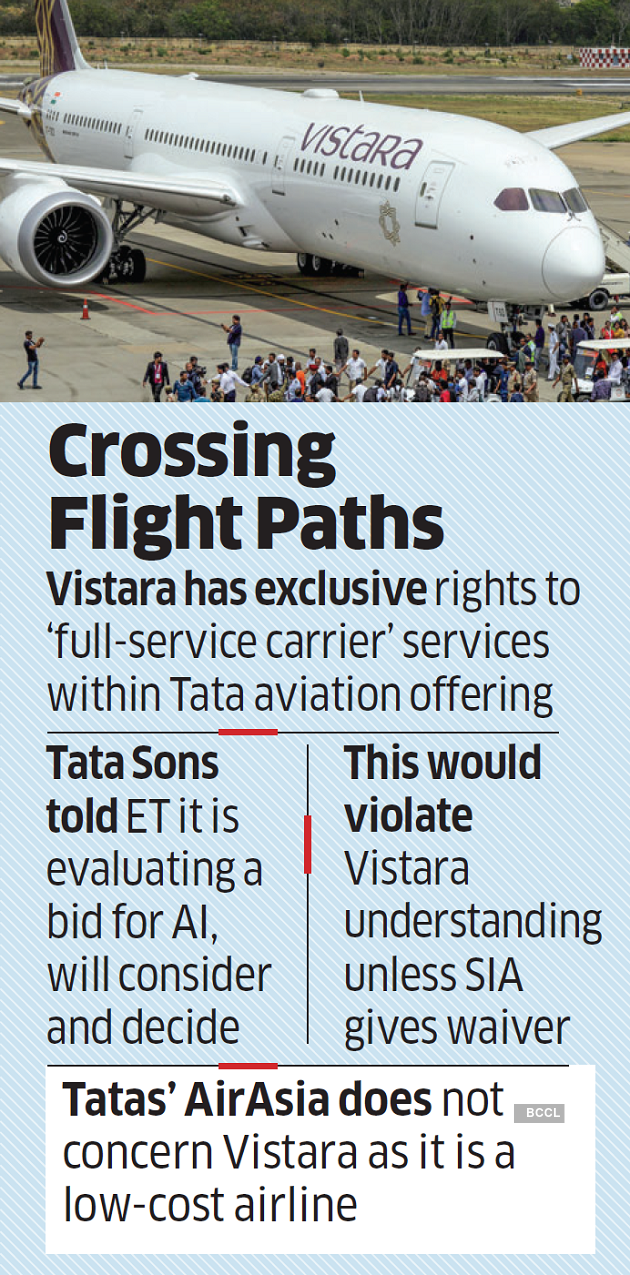Singapore Airlines (SIA), Tata group’s joint venture partner in Vistara, and Temasek, the Singaporean carrier’s majority shareholder, are believed to have voiced their misgivings to Tata Sons about its proposed bid for struggling national carrier Air India.
Top officials close to the development said concerns have been personally conveyed to Tata Sons chairman N Chandrasekaran by SIA and Temasek representatives. “Temasek also has investment in some Tata group firms and periodic evaluations are undertaken. It was during such a meet that the JV partner conveyed apprehensions,” a group insider said.
SIA declined to comment on the issue. Vistara and Tata Sons, too, did not comment. Tata Sons earlier confirmed to ET that it was evaluating a bid for Air India and would decide after consideration. The group has engaged top legal firms and consultants and begun due diligence.
Temasek and SIA’s apprehensions stem from the non-compete agreement between the Singaporean carrier and the Tata group when they decided to come together to launch Vistara.
The agreement stipulates that Vistara has an exclusive right to undertake “full-service carrier” services within the overall Tata aviation offering.

Any Air India bid must go through Vistara
A bid for Air India by Tata group on its own would violate this understanding unless SIA gives a waiver. A bid by Vistara would also require consent from SIA and Temasek, which owns 55% in SIA.
Given that Tata Sons is not in favour of having separate airlines businesses under the same roof due to cost considerations, any Air India bid would have to go through Vistara.
Vihang Virkar, aviation law expert and partner at PDS Legal, told ET that SIA and Temasek would have to agree to a Vistara bid. “The acquisition of Air India by Vistara could result in a substantial outlay of funds and assumption of risk by shareholders of Vistara. SIA and Temasek would have to evaluate whether they are willing to make an investment and assume risk of such high magnitude, especially in times when there is a huge slump in the civil aviation space.”
The SIA and Temasek objections have put the Tata group in a quandary. It can’t bid through Vistara without SIA approval and an independent bid would also require waiver of non-compete, which SIA may find it difficult to provide, given that Air India is a competing full-service airline.
Vistara doesn’t have any issues with the Tata group’s second aviation venture with AirAsia as it is a low-cost airline.
The Tata due diligence and study would also have to take into account some other factors. As per provisional figures, Air India’s total debt as on March 31, 2019, was Rs 58,351.93 crore. The government sought to make the bid attractive by reducing debt and offering 100% of the airline. Bidders will only have to absorb Rs 23,286.50 crore. The remaining debt will be transferred to Air India Assets Holding Ltd, a special purpose vehicle of the national carrier.
The government has now sought to further sweeten the deal by giving four options to the potential buyer. The buyer can choose which chunk of debt it wants to take on and may even opt not to take Air India’s aircraft debt on its books.
Meanwhile, the airline’s financial troubles continue to worsen. ET reported on September 19 that the airline has been defaulting on statutory dues such as tax deducted at source and Employees’ Provident Fund.
Other airlines interested in the national carrier are understood to be lobbying to carve out Air India Express from the national carrier, to enable them to bid for the low-cost airline.
Source: Economic Times